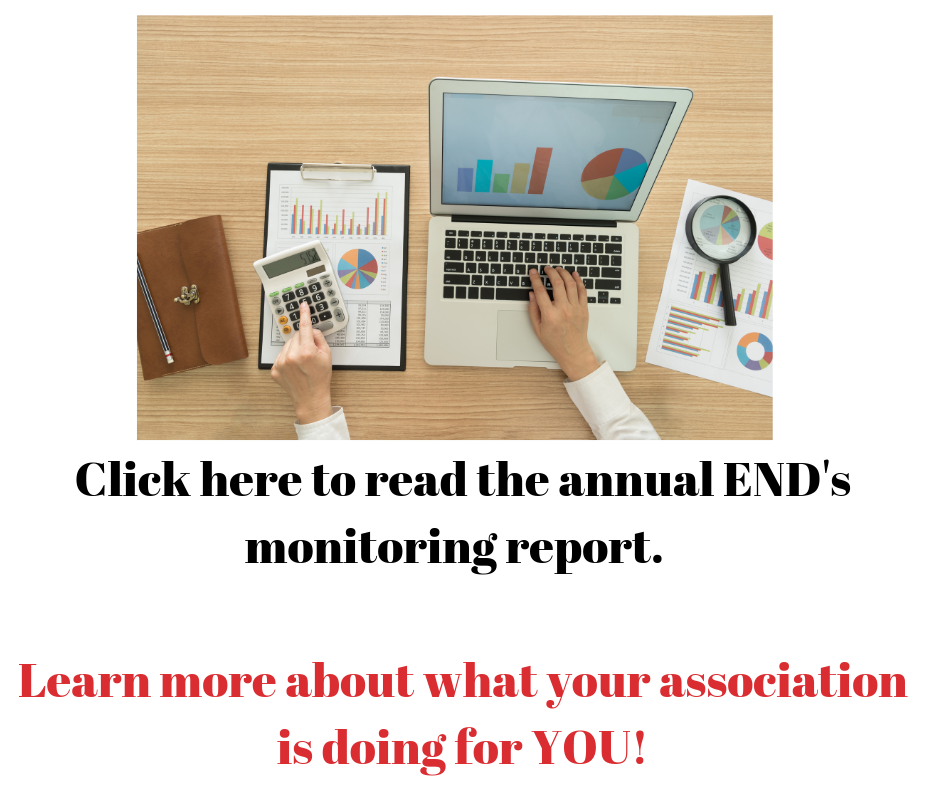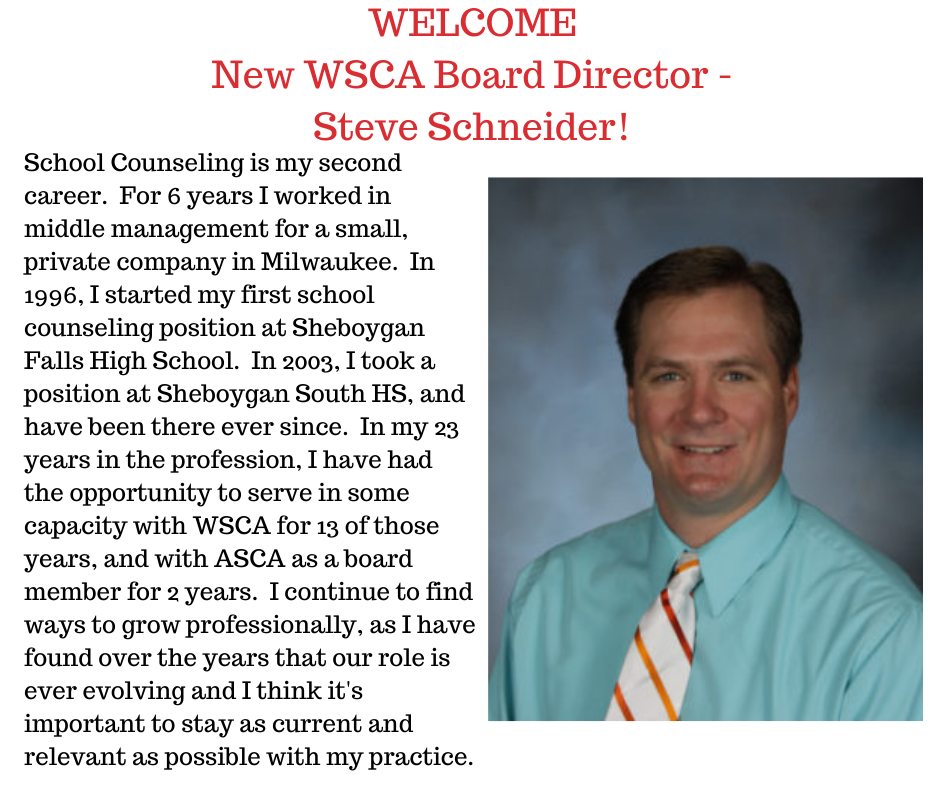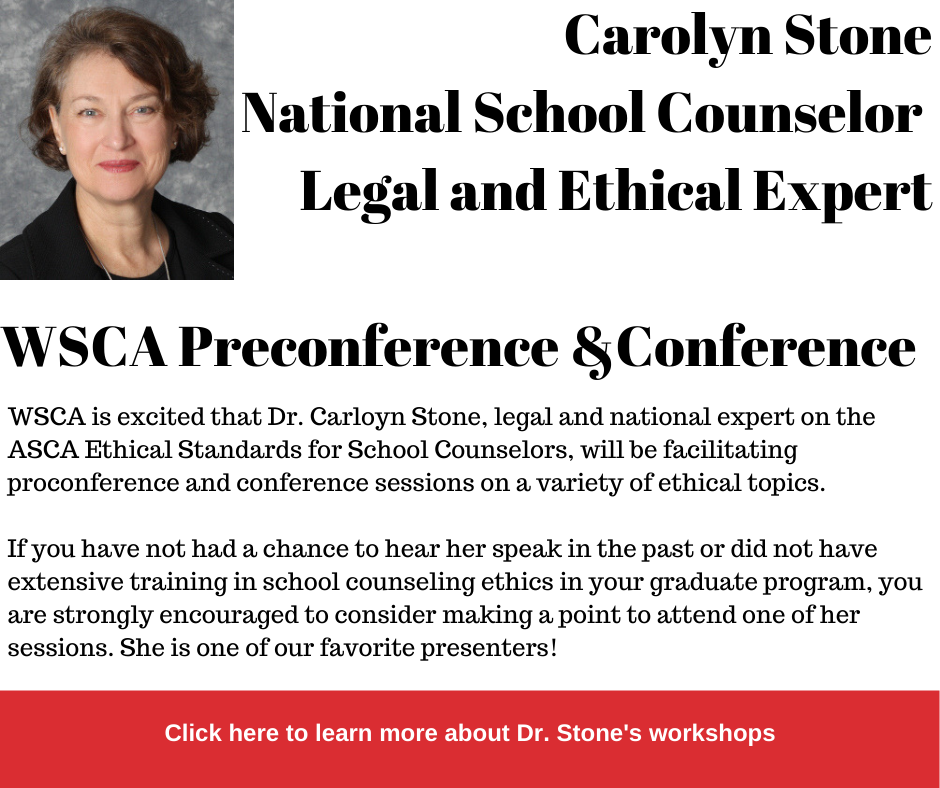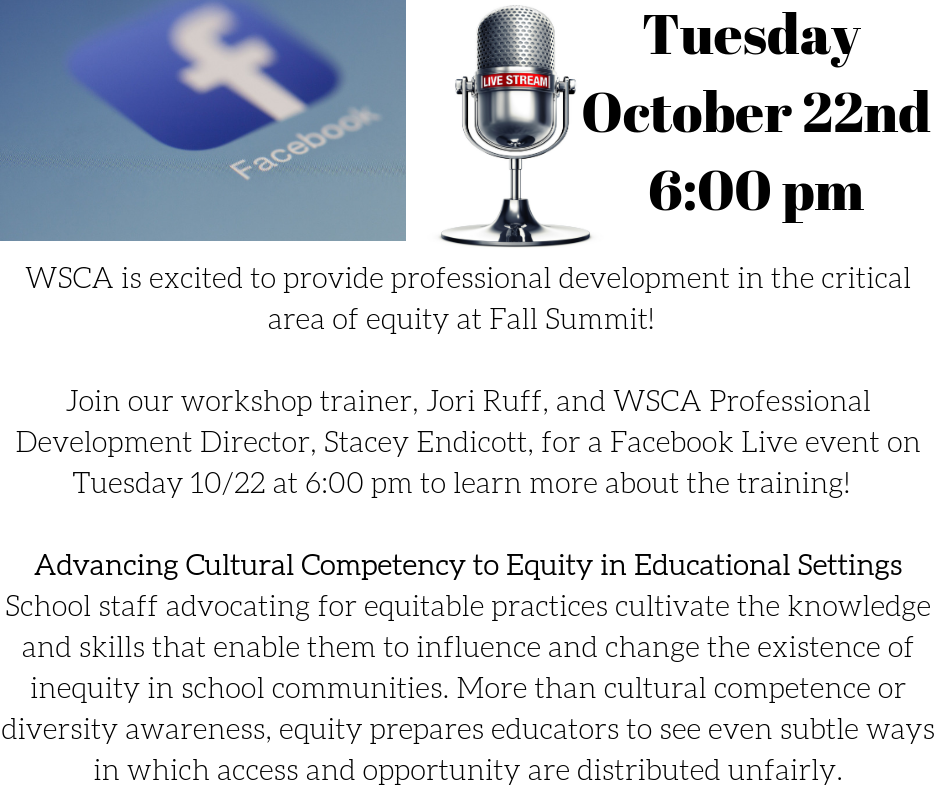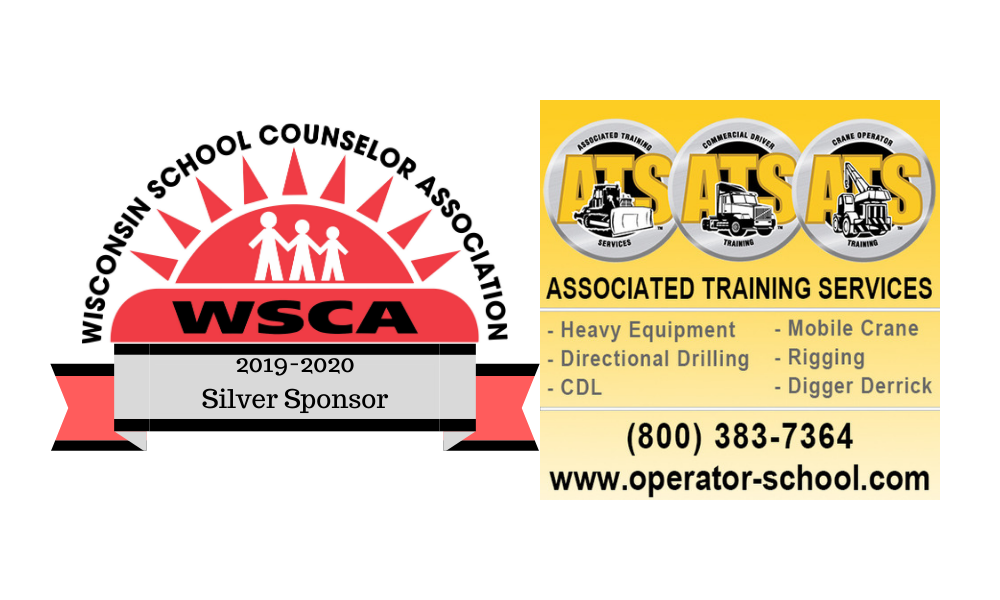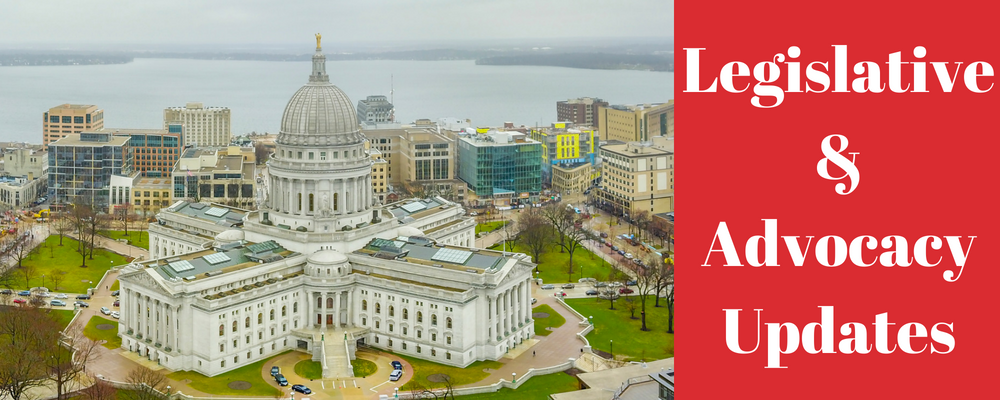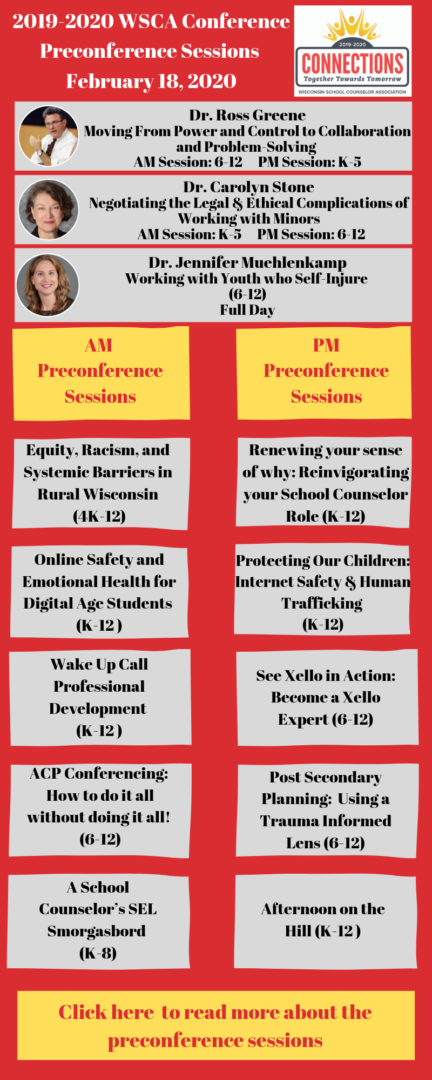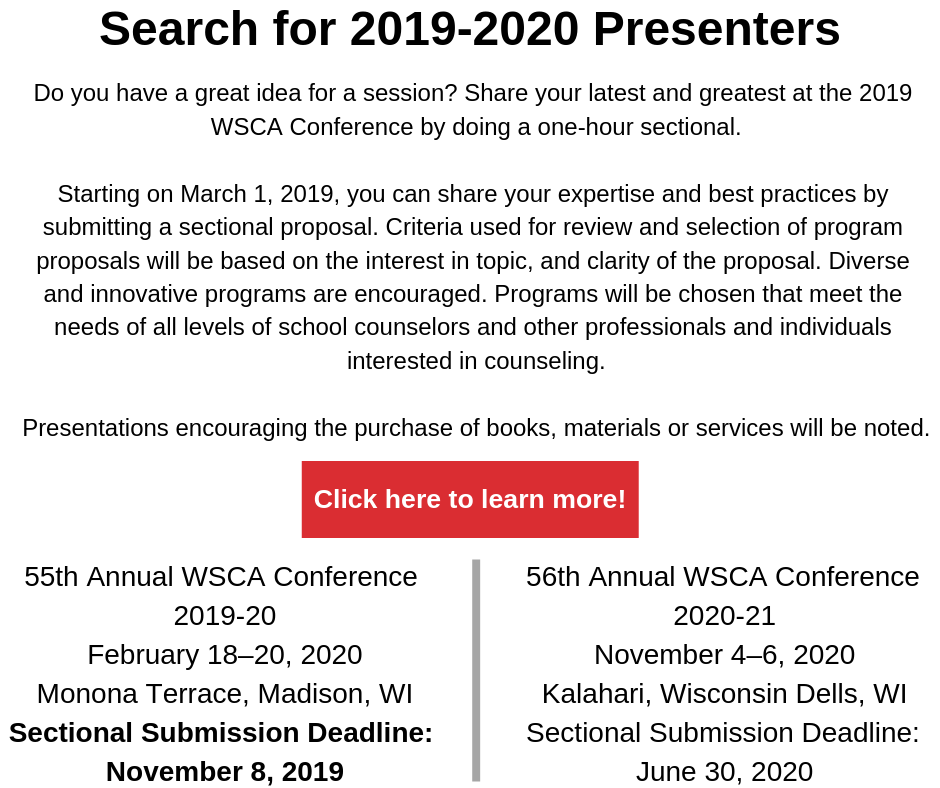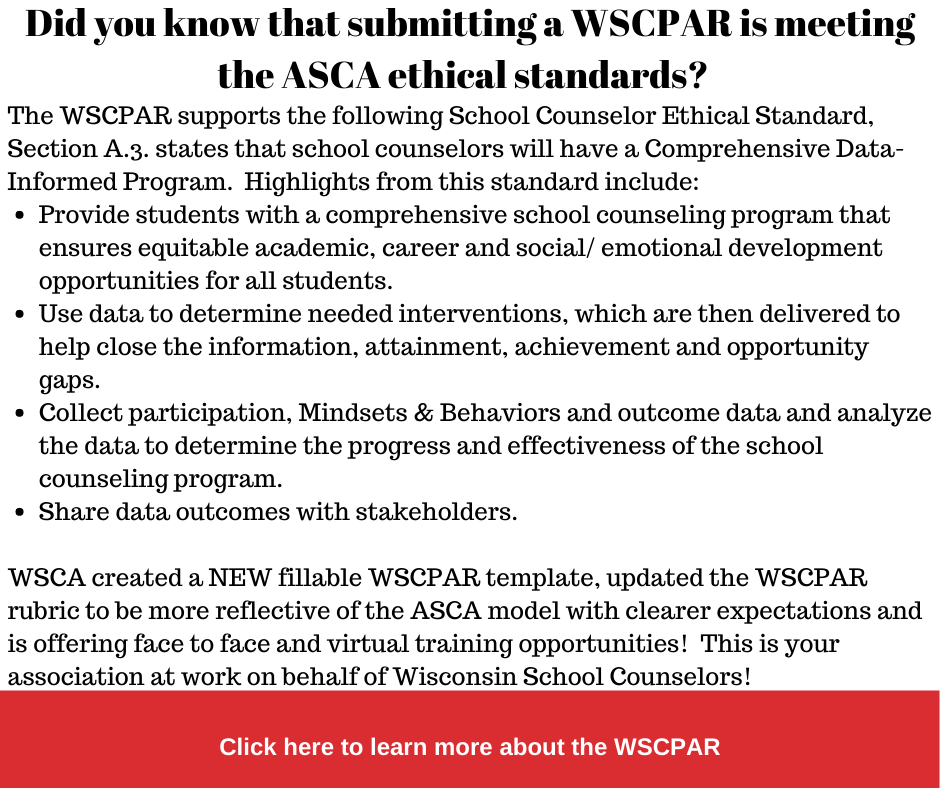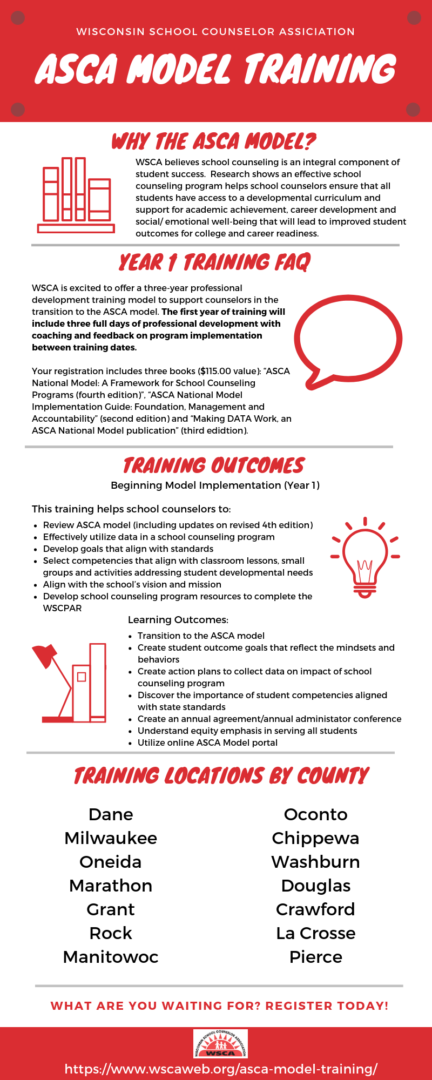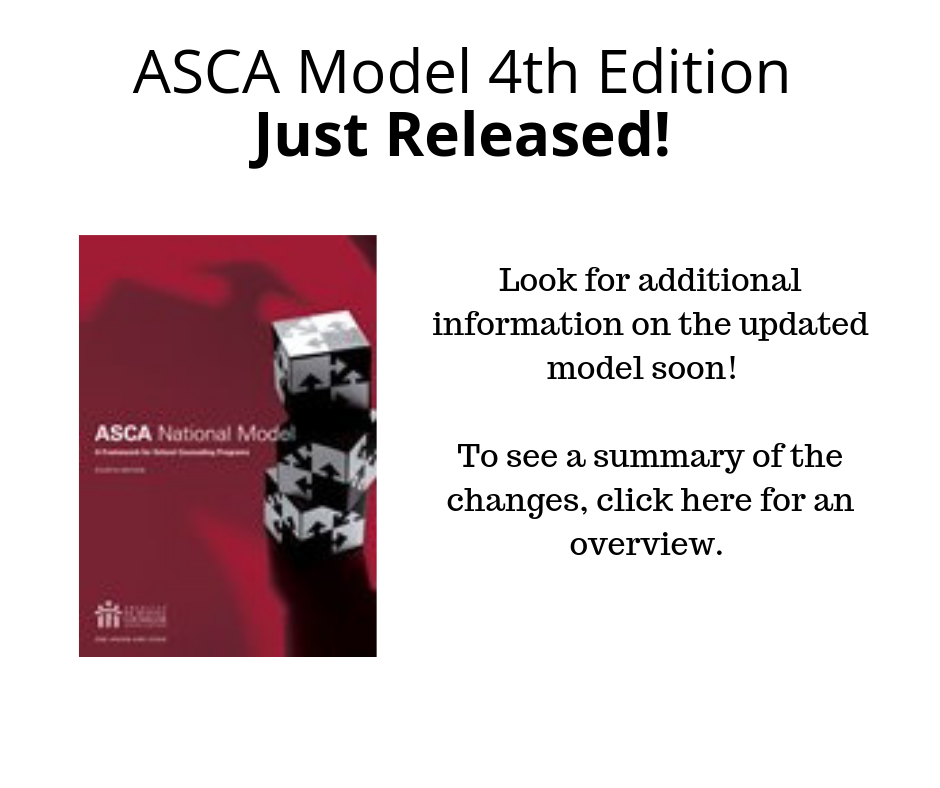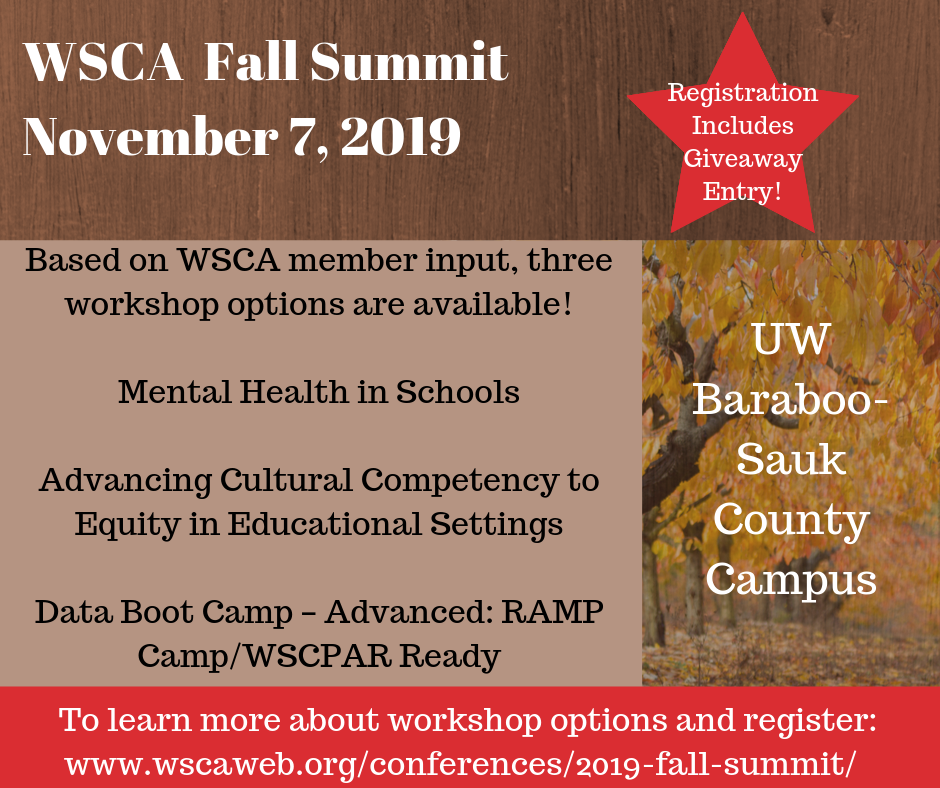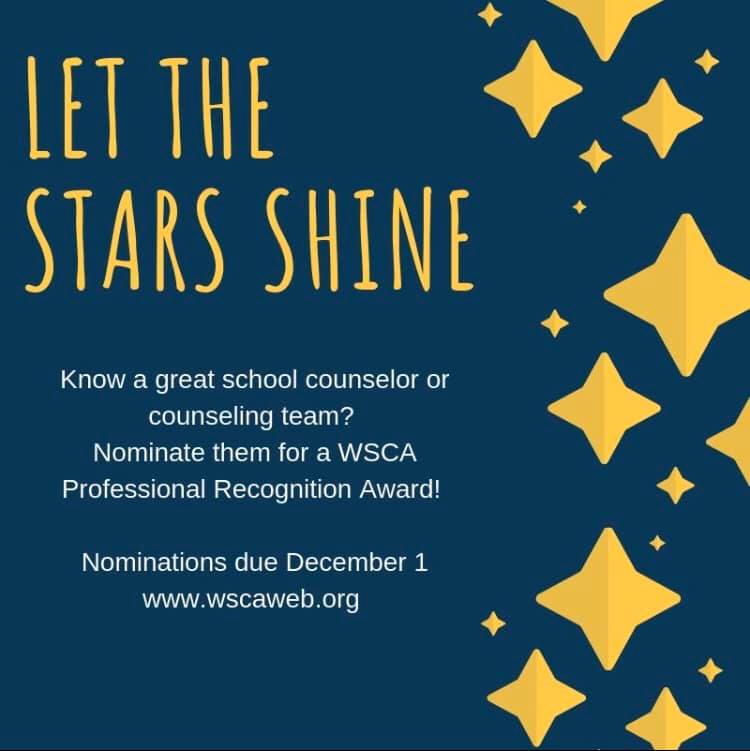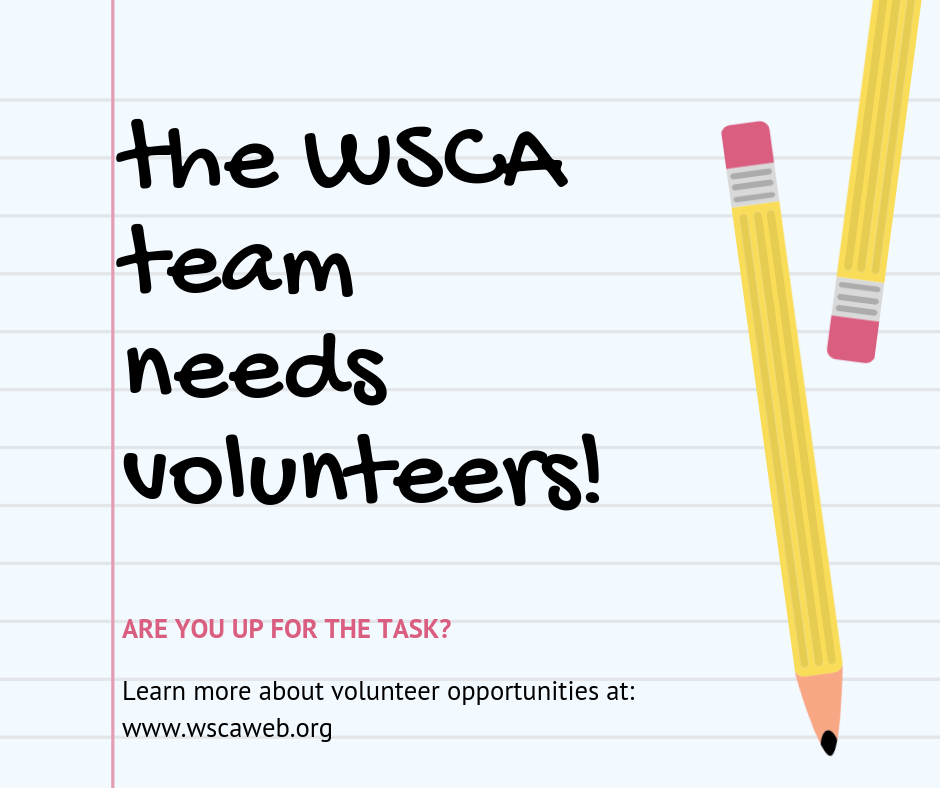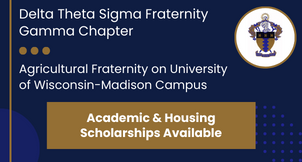October 2019

In This Issue:
A Message from ED: ASCA Ethical Standards & the ASCA Model
WSCA END’s Report
A Message from the WSCA Board- Ready to Practice Your Leadership Skills on the WSCA Board?
Feature Article: Navigating Ethical Dilemma’s
Dr. Carolyn Stone, Ethics Professional Development
Fall Summit-Equity Workshop Facebook Livestream
FREE Heavy Machine Workshop for High School Students!
Legislative Update – 2019-2020 WSCA Advocacy
2019-2020 Conference
College Goal Wisconsin
WSCPAR & ASCA Ethical Standards
ASCA Model Training
Fall Summit
Xello & Method Test Prep High School Scholarships
WSCA Professional Recognition Awards
WSCA Volunteers NeededA Message from the WSCA Exeutive Director
ASCA Ethical Standards for School Counselors and the ASCA Model
Stacy Eslick, WSCA Executive Director
Every fall I am held accountable by submitting a monitoring report to the WSCA Board of Directors to demonstrate evidence that WSCA has achieved meeting the ENDS policies the board has created. One of those ENDS is “School counselors are knowledgeable about current ethical and professional practices and their application.” Writing this report takes a great deal of reflection as well as time because WSCA has an awesome team of Director Of Operations (DOO’s) doing amazing work on behalf of the association.
In 2016, the ASCA Ethical Standards for School Counselors were reviewed and updated by ASCA. WSCA had a work group that spent many hours reviewing the standards and providing feedback to ASCA. Through that process my awareness of what is encompassed in our ethics was exponential. Like many (most?) school counselors, I tended to go to the ethical standards when having questions about student confidentiality.
WSCA is making a point to increase awareness this year on how extensive the ethics are and connecting them to school counseling practice. As we have been training counselors across the state on the updated ASCA model it is important for counselors to be aware that having a comprehensive counseling model is part of our ethical standards.
Below are a few areas I would like to highlight:
A.3. Comprehensive Data-Informed Program
School counselors:
- Collaborate with administration, teachers, staff and decision makers around school-improvement goals.
- Provide students with a comprehensive school counseling program that ensures equitable academic, career and social/ emotional development opportunities for all students.
- Review school and student data to assess needs including, but not limited to, data on disparities that may exist related to gender, race, ethnicity, socio-economic status and/or other relevant classifications.
- Use data to determine needed interventions, which are then delivered to help close the information, attainment, achievement and opportunity gaps.
- Collect participation, Mindsets & Behaviors and outcome data and analyze the data to determine the progress and effectiveness of the school counseling program. School counselors ensure the school counseling annual student outcome goals and action plans are aligned with the district’s school improvement goals.
- Use data-collection tools adhering to confidentiality standards as expressed in A.2.
- Share data outcomes with stakeholders.
A.4. Academic, Career and Social/Emotional Plans
School counselors:
- Collaborate with administration, teachers, staff and decision makers to create a culture of postsecondary readiness
- Provide and advocate for individual students’ preK– postsecondary college and career awareness, exploration and postsecondary planning and decision making, which supports the students’ right to choose from the wide array of options when students complete secondary education.
- Identify gaps in college and career access and the implications of such data for addressing both intentional and unintentional biases related to college and career counseling.
- Provide opportunities for all students to develop the mindsets and behaviors necessary to learn work-related skills, resilience, perseverance, an understanding of lifelong learning as a part of long-term career success, a positive attitude toward learning and a strong work ethic.
B.2. Responsibilities to the School
School counselors:
- Design and deliver comprehensive school counseling programs that are integral to the school’s academic mission; driven by student data; based on standards for academic, career and social/emotional development; and promote and enhance the learning process for all students.
- Advocate for a school counseling program free of non-school-counseling assignments identified by “The ASCA National Model: A Framework for School Counseling Programs” as inappropriate to the school counselor’s role.
- Provide leadership to create systemic change to enhance the school.
- Collaborate with appropriate officials to remove barriers that may impede the effectiveness of the school or the school counseling program.
- Advocate for administrators to place in school counseling positions certified school counselors who are competent, qualified and hold a master’s degree or higher in school counseling from an accredited program.
- Advocate for equitable school counseling program policies and practices for all students and stakeholders.
- Affirm the abilities of and advocate for the learning needs of all students. School counselors support the provision of appropriate accommodations and accessibility.
- Promote cultural competence to help create a safer more inclusive school environment.
- Promote equity and access for all students through the use of community resources.
- Collaborate as needed to provide optimum services with other professionals such as special educators, school nurses, school social workers, school psychologists, college counselors/ admissions officers, physical therapists, occupational therapists, speech pathologists, administrators.
B.3. Responsibilities to Self
School counselors:
- Maintain membership in school counselor professional organizations to stay up to date on current research and to maintain professional competence in current school counseling issues and topics. School counselors maintain competence in their skills by utilizing current interventions and best practices.
- Engage in professional development and personal growth throughout their careers. Professional development includes attendance at state and national conferences and reading journal articles. School counselors regularly attend training on school counselors’ current legal and ethical responsibilities.
The complete ethical standards can be found here, https://www.schoolcounselor.org/asca/media/asca/Ethics/EthicalStandards2016.pdf
Dr. Carloyn Stone, legal and national expert on the ASCA Ethical Standards for School Counselors, reminds us that our ethical standards are what we are continually striving for. As you review and reflect on these standards, consider where your counseling program currently is and making a plan on where it should be moving toward.
WSCA is your organization and here to support you in this work!
Stacy
A Message from the WSCA Board of Directors
Ready to Practice Your Leadership Skills on the WSCA Board?
Every professional association needs a Board of Directors that provides leadership and vision to ensure that the organization stays relevant for its members. WSCA has a long history of being a great School Counselor Association, benefiting from a tradition of great leadership.
Each year WSCA invites individuals to apply to be a Board Director. If you are looking for a professional leadership opportunity that will expand your understanding of the impact of the school counseling profession, then we encourage you to submit an application this year.
You will experience professional growth in the following areas as a result of being on the WSCA Board of Directors:
- Greater understanding and appreciation of the impact the school counseling profession has in Wisconsin’s educational system
- Expanded vision of the national educational initiatives that are including or asking to include school counselors in addressing PK-12 needs.
- Opportunity to learn and practice leadership skills
- Increase the depth of passion you have for your own practice as a result of seeing and hearing inspiring stories of school counselors in Wisconsin doing spectacular things!
Additional information on the application process, including the criteria for consideration and application can be found at /about-wsca/wsca-leadership-team/wsca-elections-2020-21/.
If you have questions, or want to talk further with a WSCA Board Director about the responsibilities of the position, please contact any of the following Board Directors who are members of the Nominations and Elections Committee:
- Laura Multer (Committee Chair) board+laura@wscaweb.org
- Miriam Brown board+miriam@wscaweb.org
- Steve Schneider board+steve@wscaweb.org
- Donna Okray board+donna@wscaweb.org
Navigating Ethical Dilemma’s
By Kari Erickson, School Counselor
Kari is a school counselor at Hartford Union High School and co-presented on Ethics with Carrie King (Mt. Mary Professsor) at the 2019 WSCA Conference.
Legal and ethical issues confront school counselors on a daily basis. Whether you are new to the field or have been practicing for decades, ethical dilemmas can be a source of stress, confusion, and uncertainty in our professional lives. Ethical dilemmas can vary widely from deciding how much information to share with a teacher, college recommendation letters, dual relationships, supporting students on both sides of a bullying incident, and advocating to a school board on a sensitive issue on behalf of students. The 2016 ASCA Ethical Standards for School Counselors provides a sound framework for approaching these situations within our role as professional school counselors. However, knowing the code is different from interpreting and applying it.
When our professional role delivers a difficult situation, we must ask ourselves, “What is my own ethical code? What values do I use to guide me through the decisions I make daily and how are these reflected in my behavior and character? What kind of role model am I for others?” Additionally, it helps to consider how our professional roles and responsibilities inform our work. Stadler (1986) describes three tests of the Social Constructivism Model. The first is a test of justice; would you treat others in the same situation the same way? The second is the test of publicity; would you want your behavior reported to the press? Finally, the third is the test of universality; would you recommend the same course of action to another counselor in a similar situation? Using this framework can help our decision making when faced with a legal or ethical dilemma.
It is important that school counselors not only know the ethical decision-making steps, but also how and when to consult when faced with a difficult situation. I faced an ethical dilemma when several students and staff members referred a student with suicidal ideation. After my initial assessment of this student’s safety, I consulted with two other student services team members; both agreed that we needed to contact our local crisis response agency to assist in getting this student more support immediately. I contacted the student’s parent to inform them of the presenting concern and the next steps we would take as a school to ensure the safety of the student, including reaching out to a community agency for more in depth assessment. The following week, the parent emailed the school board, claiming that I had violated the student’s rights because the student missed an all-school assembly to complete the safety assessment. The parent’s email raised questions about how our department handled the situation. Although I initially felt defensive, angry and unable to defend my actions, I also knew that my priority was to honor the student’s privacy in the same way I protected her safety. I had consulted with other professionals, acted within the limits of informed consent, and maintained the student’s privacy after the fact. At the end of the day, I had acted with integrity to my professional ethics and responsibilities, even though the outcome was unfavorable. It can be uncomfortable and even unpopular, to stand your ground in a difficult circumstance. Yet we have an obligation to meet the needs of students and uphold their dignity with integrity.
Sometimes, when our skills are rusty and we are swamped with other tasks in the beginning of the school year, ethical dilemmas are the most difficult to manage. It helps me to be prepared and front-load decision-making support for when those circumstances arise. For example, I find it helpful to have my district safety assessment protocol printed and on my desk so when a student makes a disclosure that requires enacting safety protocol, I am ready to go and I can take detailed notes directly on the form. The safety plan template includes all the valuable numbers that my student or I might need. Additionally, I have a blank template of the ASCA Decision Making Model steps ready to use to work through a difficult situation and document the names and titles of the colleagues I consult with. Having this information and these tools on hand help me to manage high stakes situations in an ethical manner. Therefore, I want to encourage you to review the ethical standards and run through ethical dilemmas, including mandated reporting and safety assessments, with your team of colleagues and/or supervisor. Reviewing your protocol will help you feel confident when you need to step into action.
Office of School Safety
The Wisconsin School Counselor Association continues to be at the table representing school counselors on the Department of Justice, Office of School Safety Advisory Board. Stacy Eslick attended the September meeting in Madison and recieved updates on reporting requirements, tip line information (including curriculum), research proposals, OSS training efforts and the creation of regional Critical Incident Response Team (S-CIRT). WSCA has been invited to be on the OSS, S-CIRT committee. The first meeting for this committee is October 21st. Updates from the OSS can be found at https://www.doj.state.wi.us/office-school-safety/office-school-safety.
Assembly education committee to hold hearing on suicide prevention bills
The Assembly Committees on Education will hold a public hearing on Thursday, October 24 at 10:00 a.m. in Room 417 North, State Capitol. The committee is chaired by state Rep. Jeremy Thiesfeldt (R-Fond du Lac) and is scheduled to take public testimony on the following bills based on recommendations of the Speaker’s Task Force on Suicide Prevention. Addidtional information can be found at https://wasb.org/assembly-education-committee-to-hold-hearing-on-suicide-prevention-bills/


